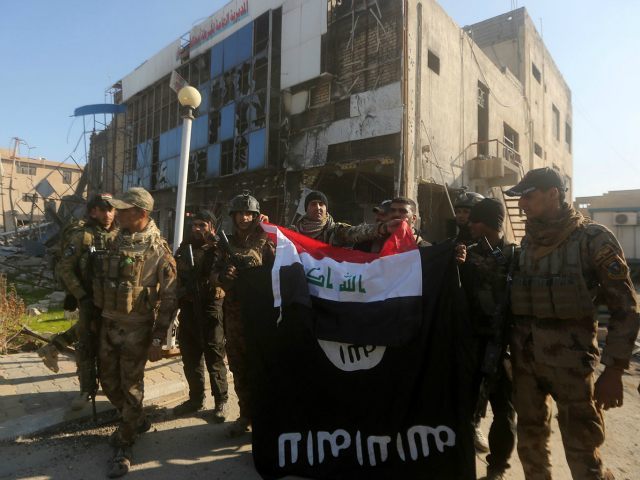A witness of the Iraqi army’s efforts to seize back Ramadi described a macabre scene, telling CNN dogs were eating the heads of the Islamic State (ISIS/ISIL) jihadists killed in the fight, while those who survived are trying to use civilians, including kids, as “human shields.”
She noted that most of the ISIS terrorists had either fled the fight for Ramadi or were executed by the Iraqi security forces, which were backed by the U.S.-led coalition in the air and allegedly by some Iran-backed Shiite militias on the ground.
“We saw them when we left our houses, we saw their dead bodies in the streets,” she told CNN on condition of anonymity after reaching a camp in Habbaniyah with her family on Saturday. “Dogs are eating their heads. We only saw their hands and their legs.”
The conditions in Ramadi are dire, according to the witness.
“We have been without food for two months, no water for the past 10 days,” she told CNN from the camp in Habbaniyah, located a nearly 25-mile drive east of Ramadi. “We were surprised when we left our home and drove outside the city, we only saw destroyed houses and roads. We could not recognize the city. It looked like another city.”
The woman and her family said they would have left sooner, but ISIS threatened to kill anyone who tried to escape.
ISIS jihadists were trying to use civilians, including children, as “human shields,” said the witness.
“We were waiting for the Iraqi army to secure a safe path for us. They told us not to leave until they do it for us,” she told CNN as she described the situation in Ramadi when she reached the camp in Habbaniyah, a 25-mile drive east of the city, with her family Saturday.“I believe they [ISIS] wanted to use us as human shields, along with our kids.”
An estimated 1,000 families remain struck in eastern Ramadi where ISIS still controls some districts, CNN quoted unnamed “Iraqis” as saying.
The CNN report also noted that the government in Baghdad believes the civilians are being used as “human shields” by the barbaric terrorist group.
Ramadi, which fell to ISIS in May, is the provincial capital of Anbar, Iraq’s largest and westernmost province. It shares a border with Syria, Jordan, and Saudi Arabia.
Echoing the witnesses cited by CNN, Eed Amash, spokesman of Anbar Governing Council, acknowledged to NBC News that, although an estimated 600 hundred families were able to flee Ramadi, an unknown number were captured by jihadists who were running away from the fight and used “as human shields.”
The Iraqi security forces claimed to have seized back Ramadi’s center and government complex last Monday.
Earlier this week, the Iraqi troops reportedly pushed ISIS out of the heart of Ramadi. The jihadists still control districts in eastern Ramadi, notes CNN.
NBC News learned from Amash that “a mass grave containing the bodies of around 40 civilians has been found [in Ramadi].”
“Once our forces clear the city from IEDs we will certainly discover more mass graves,” he predicted.
A few hundred families are now reportedly safe at the camp in Habbaniyah.
The woman who escaped along with her family are only a few of the tens of thousands of people who made it out of the city safely during the devastating fight for Ramadi, notes CNN.
“Iraqi TV showed soldiers raising the national flag over Ramadi’s government compound to mark the Iraqi military’s first major win over ISIS, which controls significant territory in Iraq and Syria,” it reports.
“But during the live coverage, explosions and gunfire could be still be heard in the background. And although up to a quarter of the city remains in the militants’ hands, it didn’t stop Iraqi Prime Minister Haider al-Abadi from declaring that 2016 ‘will be the year we drive ISIS out of Iraq,’” it adds.

COMMENTS
Please let us know if you're having issues with commenting.